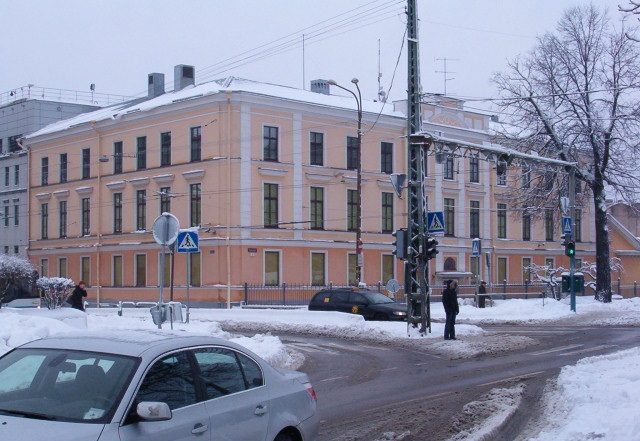
Baltic Governments Respond to Growing Russian Spy Threat
Publication: Eurasia Daily Monitor Volume: 15 Issue: 78
By:

The governments of Estonia, Latvia and Lithuania face an increasingly large espionage threat from the Russian Federation. Naturally, this threat includes the introduction or recruitment of Russian agents to engage in classical espionage activities like ferreting out classified information from government sources. But it is particularly dangerous in the Baltic States because some of these clandestine activities are designed to lay the groundwork for potential diversionary attacks by Russian agents against key local infrastructure targets. This kind of sabotage would seriously undermine the defense of these countries by their own militaries and by the North Atlantic Treaty Organization (NATO), thus helping facilitate a possible Russian advance.
Not surprisingly, the three governments have stepped up their efforts to identify and neutralize such Russian agents, either by arrest or other means (Spektr, May 18). They have had some impressive successes in the period since the Russian anschluss of Crimea, successes that have won them praise from other counties in the West. Clearly, the three Baltic States, which lived under Soviet occupation for nearly half a century, understand the modus operandi of the Russian spy agencies and thus are in a position to provide guidance to others. But at the same time, their achievements may reflect, in part, the greater Russian espionage threat they face as compared to other members of the transatlantic alliance. That is, these governments are catching more Russian spies because there are more Russian spies to catch.
Like other Western countries, the Baltic States routinely deal with Russian spies operating under diplomatic cover. All three have expelled, typically quietly, numerous Russian diplomats who were acting in a manner “inconsistent with diplomatic norms,” the usual euphemism for spying (Delfi, March 23). Yet, Russian agents based in Russian embassies can be easily tracked. Estonia, Latvia and Lithuania face a larger danger from recruited individuals inside their populations—either within the ethnic-Russian minorities (which are still numerous in Estonia and Latvia) or among dissatisfied groups within the titular nationalities. Not only are such people involved in gathering intelligence of one kind or another, but they are in many cases seeking to keep the population divided; and in the event of a crisis, they would be in a position to act as diversionists.
The multi-faceted nature of this challenge, one far greater than most other NATO countries face, has forced the Baltic countries to elaborate more ramified espionage statutes. Moreover, they have had to develop their counter-intelligence services and structures responsible for prosecuting people arrested for violation of these laws in ways that depart from what many might expect. And these differences among legal arrangements likely have more to do with differences in the number of spies caught by each one over the last four years—Estonia has arrested ten, Lithuania eight, and Latvia only two—than any serious variation in the size of the threat they face (Spektr, May 18).
Some Latvians have asked why Estonia and Lithuania catch more spies than Latvia does. At a parliamentary hearing in April 2016, Ints Ulmanis, the deputy head of the Seim (parliament) commission on national security, said that “to a large extent” Latvia’s lag is the result of its failure to elaborate the kind of espionage laws that current Russian practice requires. Latvia’s antiquated spy statues often have so many loopholes, he suggested, that those arrested for spying are not convicted. That has happened six times since 2010 (Spektr, May 18).
But he pointed to three other reasons as well: First, more Russian spies in Latvia work out of the embassy; and when they are caught spying, they are sent home without much fuss, lest that provoke Moscow to respond. Second, Latvia expelled from its security agencies those with a KGB past far earlier than did Estonia and so has not faced the problems Tallinn has. And third, unlike either of its neighbors, Latvia has not sufficiently recognized that most espionage activity on its soil involves acquiring open-source information useful to Russia or preparing people to engage in diversionary activities, although Ulmanis said that has begun to change (Spektr, May 18, 2018; Juristavards.lv, August 23, 2016).
Tallinn recognized this open-source threat far earlier than Riga or Vilnius. Hence, it elaborated laws and legal arrangements to bring those engaged in it not under the traditional espionage statues but for “conspiracy against the state of Estonia,” a measure that was introduced after the Bronze Soldier controversy of 2007. Individuals charged under these laws, Estonian prosecutors say, “are not looking for state secrets, but at the same time we see that what they are doing is occurring in a systematic fashion” and being used against Estonia and its society (Spektr, May 18).
Estonia also has centralized its investigation of spying and related activities under a single magistrate, and Lithuania has put such cases under two. That arrangement has allowed these procuracies to become more expert and more effective. Up to now, however, Latvian officials continue to treat spying as something any magistrate can deal with (Spektr, May 18).
Not surprisingly, Estonia’s success in tracking Russian spies has elicited kudos from the West (Bloomberg, February 13; The New York Times, February 9). And its Foreign Intelligence Service’s annual reports (Valisluureamet.ee, 2018) have received similar plaudits. However, in the face of Tallinn’s success, Moscow appears to have stepped up its efforts. According to Polish commentators, Russia is doing everything it can to recruit younger Estonians and thus be in a position to divide and destabilize Estonia well into the future (Radio Poland, April 13).
As a result, despite their undoubted successes in this area, none of the three Baltic countries can claim any final victory against Russian espionage efforts. Instead, this twilight struggle will continue, with each forced to develop fresh defenses against ever newer and larger Russian offensive acts.



